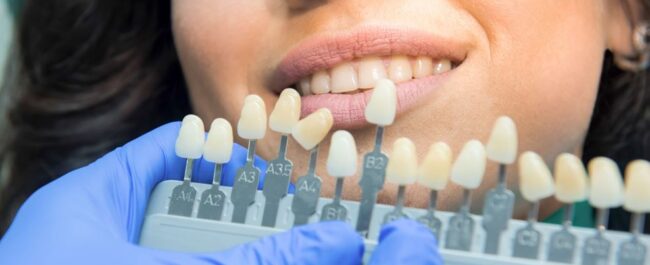6 Reasons Why Teeth Whitening Won’t Work
Who doesn’t want the confidence and perceived great looks of a whiter smile? In America, a staggering 80% of adults want whiter teeth and evidence in Canada shows the same.
Teeth whitening treatments can be effective for most people, but not necessarily for everyone. It’s important to consult with your dentist before undergoing any teeth whitening treatment. Dental professionals can evaluate your specific situation and recommend the most suitable options for achieving your best results.
At Reflections Dental Oakville, we’re here to answer all your oral care and cosmetic dentistry questions. Want to whiten your teeth to achieve your desired, confident smile? Ask us and we’ll discuss your best options!
Six Reasons why teeth whitening may not achieve great results for everyone
While teeth whitening treatments can be effective for many people, the extent of improvement depends on several factors that include the following. In turn, the results vary greatly across individuals.
1. Intrinsic Stains
Intrinsic stains are stains that occur beneath the enamel, within the dentin layer of the tooth. They can be caused by factors like trauma, excessive fluoride exposure during tooth development, or certain medications. Since teeth whitening treatments primarily target the outer layer of the teeth, they may have limited effectiveness in removing these deeper stains. In such cases, alternative cosmetic dentistry options like dental bonding or veneers may be recommended to improve the appearance of the teeth.
2. Tooth Color and Composition
The natural color of teeth can vary due to various factors, including genetics, age, and lifestyle habits. Some individuals naturally have teeth that are darker or have a yellowish tint. These teeth may have a denser enamel layer or more pigmented dentin, making them more resistant to whitening treatments. Teeth with a thicker enamel layer tend to respond better to whitening methods because the enamel acts as a barrier, allowing the whitening agents to penetrate more effectively.
3. Dental Restorations
Dental restorations like dental crowns, veneers, or fillings are typically made of materials like porcelain or composite resin that do not respond to traditional teeth whitening treatments. If you have visible restorations in your front teeth and undergo teeth whitening, the natural teeth may lighten while the restorations remain the same color. This can result in uneven coloration, requiring replacement or modification of the dental restorations to achieve a uniform appearance.
4. Age-related Factors
As we age, our teeth naturally undergo changes that can impact their color. Over time, the enamel layer can wear down, exposing the underlying dentin, which tends to be more yellowish. Additionally, the dentin itself can darken or develop micro-fractures, making teeth appear darker or discolored. Teeth whitening treatments may have limited effectiveness in addressing these age-related changes, and alternative cosmetic options may be considered.
5. Medications and Health Conditions
Certain medications, such as tetracycline antibiotics, can cause tooth discoloration during tooth development in children or when taken by adults. These stains are often deep within the tooth structure and can be difficult to remove with teeth whitening treatments alone. Similarly, certain health conditions or treatments like chemotherapy can affect tooth coloration. In such cases, alternative cosmetic solutions, such as dental bonding or porcelain veneers, may be recommended to achieve the desired aesthetic outcome.
6. Poor Oral Health and Habits
Teeth whitening treatments work best on healthy teeth and gums. If you have underlying dental issues like tooth decay, gum disease, or enamel erosion, it can affect the effectiveness and safety of whitening treatments. These conditions may require treatment before considering teeth whitening. Additionally, habits like smoking or consuming staining substances like coffee, tea, or red wine can counteract the results of teeth whitening, making it more challenging to achieve and maintain a brighter smile.
Chances are you CAN Whiten Your Teeth
Despite the reasons why some might not be able to achieve desired teeth whitening results, this is the minority of people. Also, some of the above reasons can be improved first, like improving your own oral health care regimen. It’s common that some with discolouration simply want improvement to instill confidence, if not the brightest of white teeth. Consult your dentist and find our what is right for you – you may be pleasantly surprised at what results you might achieve.


